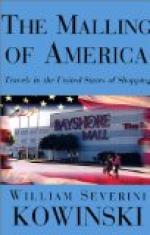“Previously to the late revolution the greater part of remittances were made to Europe by the fishery; but it has not yet recovered from the shock which it received by the war with Britain: it is however in the power of the Americans to make more advantage of the cod-fishery perhaps than, any of the european nations. We can fit out vessels at less expense, and by reason of the westerly winds, which prevail on our coasts in February and March, can go to the banks earlier in the season than the Europeans, and take the best fish. We can dry it in a clearer air than the foggy shores of Newfoundland and Nova Scotia. We can supply every necessary from among ourselves; vessels, spars, sails, cordage, anchors, lines, hooks, and provision. Salt can be imported from abroad cheaper than it can be made at home, if it be not too much loaded with duties. Men can always be had to go on shares, which is by far the most profitable way, both to the employer and fisherman. The fishing banks are an inexhaustible source of wealth; and the fishing business is a most excellent nursery for seamen; it therefore deserves every encouragement and indulgence from an enlightened and rational legislature.”
Boston, March 4th, 1797.
DEAR FRIEND,
Being very busy in making preparation for my voyage to England, I have not leisure to write you a long epistle, but enclose you one I sent to an american friend in the south.—Farewell.
This will most likely be the last letter you will receive from me on this side of the Atlantic. The French have already taken two hundred sail of american vessels. I hope my next may not be dated from Brest.
To Mr.--------,
State of--------.
DEAR SIR,
In consequence of my promise at parting, I sit down to give you some account of Yankee Land. You were perfectly right in telling me I should find the New England states very different from your part of America.
The first object that would strike you is the population of the country. In one day’s journey through Connecticut, I saw as many towns, villages, and houses, as I ever remember seeing, when travelling the same distance in England; a prospect you Buck-skins can have no idea of.
The next is the beauty of the women, (I beg their pardon; that would be the first object that would strike you!) Their great superiority in that respect may be accounted for, from their being of engllsh descent. Your women have not all that advantage, (’True english prejudice this!’ methinks I hear you mutter): great part are of dutch, or german descent. The close iron stoves they have introduced among you are terrible enemies to beauty. Why you so obstinately persist in a custom so prejudicial to health, I cannot imagine. Your plea, that the coldness of the climate makes them indispensable, I can-not admit of; you know, that we are here three degrees to the north of you, and that the present is the coldest winter since the year 1780-81; and yet I have not seen a close stove since I left New York. The tavern bills in these states are near one hundred per cent under yours. The exorbitant charges of your tavern-keepers are a disgrace to the country: I could never account for your submitting so quietly to their impositions.




